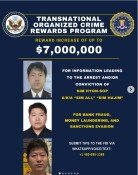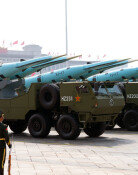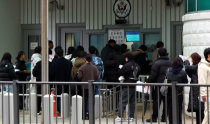Pres. Lee: US agrees on need to widen SK missile range
Pres. Lee: US agrees on need to widen SK missile range
Posted March. 22, 2012 05:14,
President Lee Myung-bak said Wednesday that South Korea and the U.S. agree that Seoul must increase its ballistic missile range due to changes such as North Koreas announcement to launch a long-range rocket.
Talks are underway between South Korea and the U.S. There is a limit in restricting Seouls missile range to up to 300 kilometers, the president said in a joint interview with selected domestic and foreign media ahead of the Nuclear Security Summit in Seoul early next week.
The media outlets included the dailies Dong-A Ilbo of South Korea, the Asahi Shimbun of Japan, the Wall Street Journal of the U.S., Financial Times and the Daily Telegraph of the U.K., and Le Monde of France.
Because North Korean missiles can fly to (the Souths) Jeju Island, we need to symmetrically (increase the missile range), he said. I expect a compromise to be reached soon because the U.S. considers South Koreas position very reasonable in drawing up a bilateral joint strategy.
President Lee through his comments indicated that the two allies are close to reaching a consensus on revising a defense accord that limits the maximum range of South Korean missiles to 300 kilometers. Under a 2001 pact, Seoul cannot develop a ballistic missile weighing more than 500 kilograms and with a range of more than 300 kilometers. North Korean missiles have a range 10 times longer than those of South Korea, as a rocket that Pyongyang launched in 2009 flew more than 3,200 kilometers.
On North Korea`s violation of an agreement with the U.S. on a moratorium on long-range missile launches after just 16 days, President Lee said, North Koreas plan to launch a so-called working satellite was not a change made after the talks with the U.S. It already had the launch plan and a strategy of holding talks with Washington first before conducting (the talks and launch) separately.
Switching to Japan`s sexual enslavement of Korean women in World War II, President Lee said, Though Japan insists that the issue was resolved by the 1965 treaty that normalized bilateral relations, no military sex slavery issue existed in 1965. The president urged Tokyo to handle the matter in a humanitarian manner since it was raised about 20 years after the agreement was signed.
phark@donga.com





![[오늘과 내일/우경임]교육부 장관인가, 교사부 장관인가](https://dimg.donga.com/c/138/175/90/1/wps/NEWS/IMAGE/2025/12/26/133045801.1.png)

